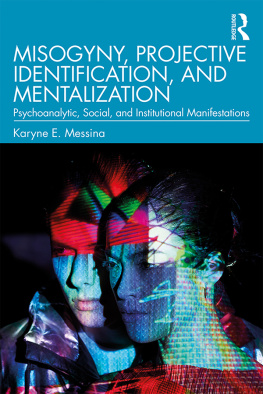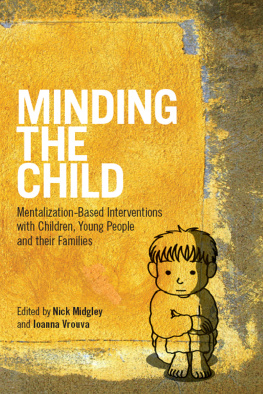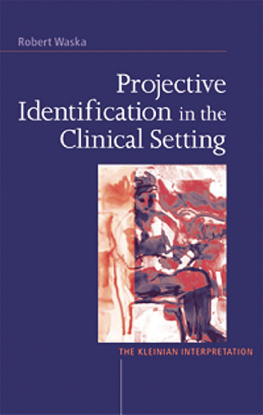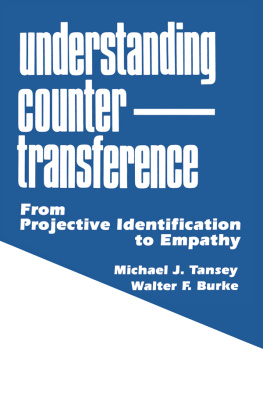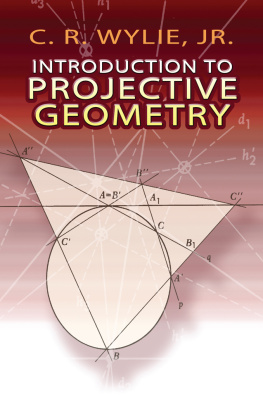Misogyny, Projective Identification, and Mentalization
Misogyny, Projective Identification, and Mentalization looks at how the psychoanalytic concepts of projective identification and mentalization may explain the construction of society and how they have enabled misogyny to be expressed in social, political, and institutional settings. Karyne E. Messina explores how misogyny has affected the perception and treatment of women through analysis of a range of examples of individual women and groups.
The first part explores projective identification as a mechanism for the suppression of women, looking at the origins of the concept in psychoanalysis and its expansion. The author examines the story of Clara Thompson as an example, arguing that her virtual disappearance from the history of psychiatry and psychoanalysis itself is a telling example of this process at work. The second part of the book uses four examples of individuals, including the recent election loss by Hillary Clinton in 2016, to show that projective identification can (particularly in political and cultural settings) overtake and motivate groups as well as individuals, and lead to violence, atrocity, humiliation, and dismissal of and against women. Part three then features case studies of four groups of women from the 20th century, including victims of the 1994 Rwandan genocide, showing how projective identification against groups has occurred.
With specific reference to the erasure of womens contributions in society, both individually and collectively, and the trauma that arises from the many effects of regarding women as a group as less or other, this is a book which sets a new agenda for understanding how misogyny is expressed socially. Misogyny, Projective Identification, and Mentalization will be of interest to psychoanalysts and psychoanalytic psychotherapists as well as scholars of politics, gender, and cultural studies.
Karyne E. Messina, Ed.D., FABP, is a psychologist and supervising analyst at the Washington Baltimore Center for Psychoanalysis and is on the medical staff of Johns Hopkins Medicine in Bethesda, Maryland, USA. She maintains a full-time private practice in Chevy Chase, Maryland. She was previously the Director of the Meyer Treatment Center at the Washington School of Psychiatry and the Director of Continuing Education for Women at George Washington University.
This book presents novel ideas that advance not only the understanding of projective identification, but also concepts related to the aspects of work that promote improvement in psychotherapy that I have not seen before. I think that the topics of the book will be of universal interest to a variety of readers for many years to come, as the issue of discrimination not only continues to be a struggle, but in recent times, the Me Too movement gives these questions urgency not seen before. The book contains a very contemporary application of theory on social experience; it is likely to become a tour de force work.
Harry Gill, Assistant Clinical Professor, George Washington University; Medical Director, Suburban Hospital, Johns Hopkins Medicine, USA
Here Karyne E. Messina explores misogyny through a psychoanalytic lens. Familiar with many theoretical perspectives and using wide-ranging examples, she shows how psychoanalytic theories contribute to an understanding of misogynys unconscious roots and its potential for resolution. The reader is guaranteed a thoughtful, thorough and suspenseful journey through this timely topic.
Helen Stein (retired), Consultant, New York State Psychiatric Institute,Center for the Study of Trauma and Resilience; Psychologist, private practice, New York City, USA
In this important book, psychoanalyst Karyne E. Messina describes the damaging effects of what she calls the emotional violence of silence, the deployment of power to erase the contribution of women throughout history. Today in the age of the Me Too movement, women are starting to speak outbut the rising tide of voices still has to combat a long history of systemic suppression. Understanding these forces has never been more timely. This book can help us break the cycle and usher in a new and necessary cultural shift.
Maddie Grant, Culture Consultant and Digital Strategist and Founding Partner, WorkXO, Washington, DC, USA
Dr. Messinas book takes up the worryingly persistent problem of misogyny. Marshaling several rich examples, she shows how the process of projective identification illuminates diverse manifestations of violence against women. Drawing on attachment theory, she explains how self-awareness and perspective-taking can allow us to escape the grips of projective identification and potentially ameliorate the continuing prejudicial ways women are treated. This book makes an important contribution to further our understanding of the problem of misogyny.
Shweta Sharma, Assistant Professor in the Menninger Department of Psychiatry & Behavioral Sciences at Baylor College of Medicine; Staff Psychologist at the Menninger Clinic, Houston, Texas, USA
First published 2019
by Routledge
2 Park Square, Milton Park, Abingdon, Oxon, OX14 4RN
and by Routledge
52 Vanderbilt Avenue, New York, NY 10017
Routledge is an imprint of the Taylor & Francis Group, an informa business
2019 Karyne E. Messina
The right of Karyne E. Messina to be identified as author of this work has been asserted by her in accordance with sections 77 and 78 of the Copyright, Designs and Patents Act 1988.
All rights reserved. No part of this book may be reprinted or reproduced or utilised in any form or by any electronic, mechanical, or other means, now known or hereafter invented, including photocopying and recording, or in any information storage or retrieval system, without permission in writing from the publishers.
Trademark notice: Product or corporate names may be trademarks or registered trademarks, and are used only for identification and explanation without intent to infringe.
British Library Cataloguing-in-Publication Data
A catalogue record for this book is available from the British Library
Library of Congress Cataloging-in-Publication Data
Names: Messina, Karyne E., author.
Title: Misogyny, projective identification, and mentalization : psychoanalytic, social, and institutional manifestations / Karyne E. Messina.
Description: Abingdon, Oxon ; New York, NY : Routledge, 2019. | Includes bibliographical references and index.
Identifiers: LCCN 2018056882 (print) | LCCN 2018058825 (ebook) | ISBN 9780367192235 (e-Book) | ISBN 9780429578793 (Adobe) | ISBN 9780429574573 (Mobipocket) | ISBN 9780429576683 (ePub) | ISBN 9780367192143 (hardback : alk. paper) | ISBN 9780367192211 (pbk. : alk. paper)
Subjects: LCSH: Projective identification. | Misogyny. | Metacognition.
Classification: LCC RC455.4.P76 (ebook) | LCC RC455.4.P76 M47 2019 (print) | DDC 616.89dc23
LC record available at https://lccn.loc.gov/2018056882
ISBN: 978-0-367-19214-3 (hbk)
ISBN: 978-0-367-19221-1 (pbk)
ISBN: 978-0-367-19223-5 (ebk)

